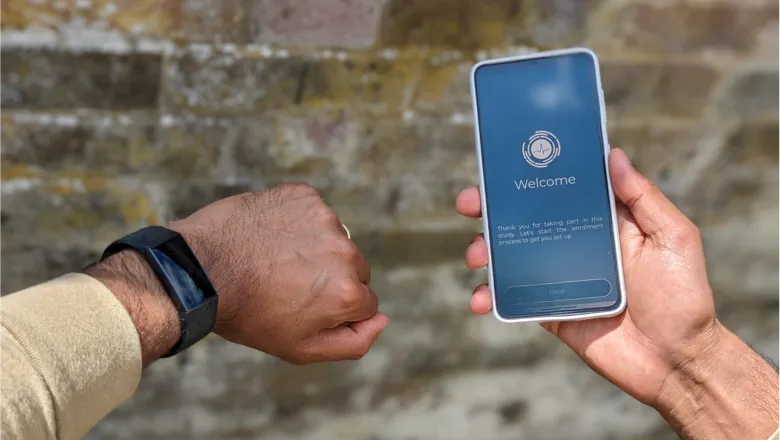About Biostatistics & Health Informatics
The department has been a major force in the development of quantitative methodology as applied to mental health research, with significant national and international collaborations, and with growing impact into all areas of medicine particularly through expertise in trials and software development. The department is organised into two groups, though we often work closely together on projects.
Biostatistics
The Biostatistics Group is made up largely of statisticians. We have five primary areas of methodological and applied research: prediction modelling and personalized medicine; causal evaluation and the analysis of therapeutic mechanism; the Psychometrics & Measurement Lab; life course research; and mental health clinical trial statistics and methodology. Our statisticians also provide statistical collaboration for both introductory and advanced training in applied statistical methodology.
The Institute has had a dedicated biostatistics department since 1964, opened then as the Biometrics Unit by Professor A.E. Maxwell, and now headed by Professor Daniel Stahl.
We led the Trials, Genomics and Prediction theme [RE1] of the NIHR Maudsley Biomedical Research Centre[RE2] , that aims to deliver a step-change in patient-centred, data-driven mental health research at scale.
The department is host of the national NIHR Research Support Service Hub specialising in Mental Health and Neuroscience. It provides a comprehensive framework for research design, development, collaboration, and implementation and offers continuous assistance from the initial pre-application stages to the subsequent post-application phases. The department supports the UKCRC accredited King's Clinical Trials Unit which provides randomisation, data management, trial management and statistical analysis for a growing portfolio of clinical trials in all health and social care.
Health Informatics
The Health Informatics Group at the Department of Biostatistics & Health Informatics is headed by Professor Richard Dobson. The Group's research is focused on translational bioinformatics and its application to complex disease. It is comprised of a mix of data and computer scientists, research software engineers and clinical & bio-informaticians, focused on the use of data from 'omics, electronic health records, the exposome, smartphones and wearables for real-time tailored care and alerting, trial recruitment, patient stratification and research. This multi-disciplinary team is able to develop and implement solutions for analysing and interpreting complex integrative datasets and for communicating findings to clinicians and patients.
Via the NIHR Maudsley Biomedical Research Centre, Health Informatics is one of the three founding partners behind ‘Rosalind’, a shared, high performance computing facility launched in October 2015. Rosalind provides researchers with a flexible, private cloud environment, alongside traditional compute facilities for bioinformatics, clinical informatics, imaging, sequencing and genomics, supporting next generation, large-scale analyses that will accelerate translational research across the biomedical, life sciences, and health informatics disciplines.
The Precision Health Informatics Data Lab group, led by Professor Richard Dobson, is motivated towards enabling a “panoramic” view of patients that is precise, predictive, preventative and participatory, through the integration of traditional ‘omics data with data derived from mHealth, electronic patient records, knowledge graphs. The group works closely alongside the National Institute for Health Research Maudsley Biomedical Research Centre (NIHR Maudsley BRC) supporting their translational research into novel tests, treatments and technologies to understand and treat mental disorders.
Our courses
Duration: One Year
This course has been created to deliver a skill set and knowledge base in “multimodal” and “big data” analysis techniques.
View course
-

Senior Teaching Fellow
-

Reader in Biostatistics and Epidemiology
-

Statistician Research Fellow
-

Senior Lecturer
-

PhD Student
-

Research Associate
-

Software Developer
-

Statistician
-

Lecturer in AI for speech analysis
-

Postdoctoral Research Associate in Speech for mHealth Applications
-

Professor of Medical Bioinformatics
-

Research Fellow
-

NIHR Research Professor
-

BRC-MH Software Development Group Leader
-

Clinical Trials Statistician
-

Professor of Medical Statistics and Complex Intervention Methodology
-

NIHR Pre-Doctoral Research Fellow
-

Research Fellow
-

Reader in Bioinformatics
-

Senior Lecturer in Artificial Intelligence in Medicine
-

Senior Lecturer in Statistical Learning for Precision Medicine
-

Statistician
-

Statistician
-

NIHR Pre-Doctoral Fellow
-

Research Fellow in Health Informatics
-

Research Coordinator
-

Research Fellow
-

NIHR Pre-Doctoral Research Fellow
-

Postdoctoral Research Systems Engineer
-

NIHR Doctoral Research Fellow
-

Research Associate - Statistician
-

Professor of Biostatistics and Psychological Methods
-

Software Developer and PhD student
-

Senior Research Fellow & Technical Lead
-

Senior Lecturer in Health Informatics
-

Researcher
Click here for a full list of people associated with this Department
Our current research groups
The ADHD Remote Technology (ART) research programme focuses on the development and application of a novel remote measurement technology system for ADHD
The Causal Modelling Group comprises statisticians and methodologists at King’s College London interested in drawing causal inferences from study data.
The lifecourse epidemiology group researches developmental change, especially in childhood and adolescence. We specialise in methodology for longitudinal data including structural equation modelling.
Precision Medicine & Statistical Learning
Research in the Lab focuses on the methodology and applications of psychometrics, psychological measurement, mathematical psychology, and social statistics.
The Mental Health & Neuroscience Clinical Trial Statistics Group at King's College London
The Trials Methodology Research Group is focussed on improving the design, conduct and analysis of clinical trials for the benefit of participants, researchers, and others who use the evidence to make decisions about healthcare.
In-Person Education Courses
Much of applied health and social research is aimed at estimating causal effects of risk factors or interventions (treatments, programmes, policies etc.). This includes assessments carried out by research organisations to inform their strategies and help with their management and funding decisions (policy and programme evaluation). However, it is not always clear whether the quantity targeted in a particular analysis/assessment has a causal interpretation and even if that is the case, whether it can be estimated without bias from the study data. For example, findings from observational studies are frequently criticised for lacking confounding control.
You will receive world-class training in core applied statistical methodology, machine learning, and computational methodology, and you will have the opportunity to apply your skills to real-life settings facilitated by the world-leading Institute of Psychiatry, Psychology & Neuroscience.
The course will apply to a broad spectrum of graduates preparing for a career in medical statistics and health informatics, or professional methodologists and clinical researchers working in the private or public health sector who are interested in state-of-the-art technologies training from world-class experts.
This course is also suitable if you are a graduate in/work in the fields of psychology, medical/health sciences, bioinformatics, data science, statistics, maths, physics, engineering and natural science.
The course provides a comprehensive introduction to trial design features used to mitigate bias, important aspects of trial design, conduct, analysis and reporting, and challenges and solutions for conducting RCTs with some focus on behavioural interventions. This will include some coverage of methods for elucidation of treatment mechanisms (e.g. mediation). Throughout the course the emphasis will be on practical issues faced by researchers in the conduct and analysis of RCTs through the lens of the mental health setting, and participants will be provided with skills to design, conduct and analyse rigorous RCTs in this research area. , conduct, analysis and reporting, and challenges and solutions for conducting RCTs with some focus on behavioural interventions. This will include some coverage of methods for elucidation of treatment mechanisms (e.g. mediation).
Throughout the course the emphasis will be on practical issues faced by researchers in the conduct and analysis of RCTs through the lens of the mental health setting, and participants will be provided with skills to design, conduct and analyse rigorous RCTs in this research area.
Starting from the scale construction and gradually moving to the most recent statistical methods employed in measurement, the course provides a complete methodological framework for applied researchers. While the classical test theory ideas on reliability and validity, often used in the literature, are presented, the more methodologically sound item response theory counterparts are explained (difficulty and discrimination, item and total characteristic and information curves).
This course will provide a comprehensive introduction to the fundamentals of modern health-focused informatics research. The course will delve into a problem intrinsic to the domain, as well as general questions of how informatics techniques can help alleviate them, enabling the re-use o improve workflow and care.
This 3-day course is open to a range of student backgrounds to serve as an introductory component of medical and health informatics and the diverse issues related to electronic medical records, public health research and eHealth.
In this course, students will understand the major issues related to applying informatics techniques to the medical domain as well as the challenges faced by researchers working on medical records today. The students will also have obtained hands-on experience through analysis of case studies the advantages and challenges of applying health informatics techniques in various clinical and medical settings.
To understand the theoretical basis of programming, and to apply this knowledge to a diverse range of practical problems. To relate general concepts in programming to language-specific instances in R and Stata.
To understand the theoretical basis of generalized linear and generalised mixed models to apply to a diverse range of practical problems. To relate modern statistical models and methods to real life situations and use relevant computer software (STATA) for statistical analysis.
As health care data becomes more complex and multimodal, the structure of the data becomes increasingly complicated. There could be an increasing number of repeated measurements on the same individuals over time, longer duration of follow-up for time-to-event outcomes or nested hierarchies leading to non-independence of individuals. The use of simpler statistical approaches to analyse these data is invalid because the key assumptions of those approaches do not hold.
In this course, we introduce the concept of multilevel and longitudinal modelling, including time-to-event or survival analysis. The aim is for the student to understand the challenges of longitudinal and clustered data, and the concept and implementation of multilevel models. Students will also become familiar with the most common models for time-to-event data (inc. Cox proportional hazard models, additive hazard models), and finally link all these concepts together through joint modelling of survival and longitudinal data. Students will discover Stata commands that can fit all of these models and become familiar with the resulting Stata output, whilst applying them to real data structures.
Courses under Innovation Scholars
This course is tailored to empower you with the knowledge and skills required to harness the potential of machine learning within the medical and health research domains. In this course, you will learn a range of different Artificial Intelligence Algorithms. You will learn the key characteristics of these algorithms, and how to implement them within Python. After completing the course, you will be able to make decisions about when and how to implement different AI solutions for common problems you may encounter.This course is roughly 20 hours of learnings with video lectures, quizzes and hands-on practical programming examples for you to work through.
This course is for you if:
- You have a foundational understanding of data and wish to explore the world of machine learning as it applies to health research.
- Work in a health-related sector, be it clinical, administrative, or academic roles - this can be as a doctor, health data analyst, public health researcher, and beyond.
- You appreciate a learning structure that adapts to your busy schedule.
- You aim to grasp the core concepts and applications of machine learning in the realm of health, without delving deep into its mathematical intricacies.
Basic working knowledge of Python is required.
Learning objectives of Machine Learning for Health Research.
- Gain an in-depth understanding of diverse ML algorithms and their applications in health research.
- Handle missing data, particularly in the context of Electronic Health Records.
- Utilize and optimize tree-based and ensemble models for complex health data.
- Implement neural networks and understand their learning processes.
- Effectively manage the entire machine learning pipeline from data acquisition to model evaluation.
- Achieve data imputation using sophisticated techniques.
- Understand the ethics and challenges in applying ML in healthcare contexts.
Click here to access course
This module introduces you to the basics (and beyond) of the Python object-oriented programming language and gets you started working with it, such that by the end of the module you will be able to work independently in Python. No background in coding or Python is expected as a pre-requisite to this module.
Click here to access course
To provide a comprehensive introduction to the fundamentals of clinical prediction modelling using modern statistical modelling techniques for health research. It will cover all steps of developing and accessing a prediction model. Computer based teaching introduces students the theory and practical implementation of cutting-edge predictive statistical and machine learning modelling techniques using the R statistical software.
The course covers all major steps of developing and accessing a clinical prediction model, including study design and data preparation, the problem of over-fitting in regression models, how to overcome over-fitting using penalized regression and cross-validation methods, how to deal with missing data, feature variable selection using random forests, and performance assessment and clinical usefulness of a model. Each day a short presentation of an application in prediction modelling will be presented. Teaching will be through lecturers and practical computer lab session interspersed with short presentations of prediction modelling researchers on current work. Practical sessions will involve the analyses and interpretation of practice datasets using the software R. Syntax of all procedures will be provided and explained but some familiarity with a syntax-based software (R, Stata, SAS) is advised. A short 2 h introduction to R will be provided at the beginning of the course.
Click Here to Access course - Predication Modelling
The course aims to provide an introduction to the major techniques of natural language processing, and to provide participants with the skills to create their own NLP applications, using both rules based and statistical approaches. Methods will be introduced for extracting structured information from text, and for automatically classifying text, together with the selection of data for training and for evaluation.
Course coming soon
This course aims to provide a basic introduction to the R software. This will cover:
obtaining and installing R,
dealing with various data objects such as vector, matrix and data frame,
importing/exporting data from/to ASCII text, spread sheet (Excel) and other statistical software (e.g., Stata, SPSS)
some statistical analysis in R such as summary statistics, t-test, chi-squared test, linear regression, logistic regression and
R graphics using ggplot2 for creating and storing graphics in R.
Click here to access course - Intro to R
Education Courses
Much of applied health and social research is aimed at estimating causal effects of risk factors or interventions (treatments, programmes, policies etc.). This includes assessments carried out by research organisations to inform their strategies and help with their management and funding decisions (policy and programme evaluation). However, it is not always clear whether the quantity targeted in a particular analysis/assessment has a causal interpretation and even if that is the case, whether it can be estimated without bias from the study data. For example, findings from observational studies are frequently criticised for lacking confounding control.
You will receive world-class training in core applied statistical methodology, machine learning, and computational methodology, and you will have the opportunity to apply your skills to real-life settings facilitated by the world-leading Institute of Psychiatry, Psychology & Neuroscience.
The course will apply to a broad spectrum of graduates preparing for a career in medical statistics and health informatics, or professional methodologists and clinical researchers working in the private or public health sector who are interested in state-of-the-art technologies training from world-class experts.
This course is also suitable if you are a graduate in/work in the fields of psychology, medical/health sciences, bioinformatics, data science, statistics, maths, physics, engineering and natural science.
To provide a comprehensive introduction to the fundamentals of clinical prediction modelling using modern statistical modelling techniques for health research. It will cover all steps of developing and accessing a prediction model. Computer based teaching introduces students the theory and practical implementation of cutting-edge predictive statistical and machine learning modelling techniques using the R statistical software.
The course covers all major steps of developing and accessing a clinical prediction model, including study design and data preparation, the problem of over-fitting in regression models, how to overcome over-fitting using penalized regression and cross-validation methods, how to deal with missing data, feature variable selection using random forests, and performance assessment and clinical usefulness of a model. Each day a short presentation of an application in prediction modelling will be presented. Teaching will be through lecturers and practical computer lab session interspersed with short presentations of prediction modelling researchers on current work. Practical sessions will involve the analyses and interpretation of practice datasets using the software R. Syntax of all procedures will be provided and explained but some familiarity with a syntax-based software (R, Stata, SAS) is advised. A short 2 h introduction to R will be provided at the beginning of the course.
The course provides a comprehensive introduction to trial design features used to mitigate bias, important aspects of trial design, conduct, analysis and reporting, and challenges and solutions for conducting RCTs with some focus on behavioural interventions. This will include some coverage of methods for elucidation of treatment mechanisms (e.g. mediation). Throughout the course the emphasis will be on practical issues faced by researchers in the conduct and analysis of RCTs through the lens of the mental health setting, and participants will be provided with skills to design, conduct and analyse rigorous RCTs in this research area.
This course will provide a comprehensive introduction to the fundamentals of modern health-focused informatics research. The course will delve into a problem intrinsic to the domain, as well as general questions of how informatics techniques can help alleviate them, enabling the re-use o improve workflow and care.
This 3-day course is open to a range of student backgrounds to serve as an introductory component of medical and health informatics and the diverse issues related to electronic medical records, public health research and eHealth.
In this course, students will understand the major issues related to applying informatics techniques to the medical domain as well as the challenges faced by researchers working on medical records today. The students will also have obtained hands-on experience through analysis of case studies the advantages and challenges of applying health informatics techniques in various clinical and medical settings.
This course aims to understand the theoretical basis of programming, and to apply this knowledge to a diverse range of practical problems. To relate general concepts in programming to language-specific instances in R and Stata.
This course aims to provide a basic introduction to the R software. This will cover:
obtaining and installing R,
dealing with various data objects such as vector, matrix and data frame,
importing/exporting data from/to ASCII text, spread sheet (Excel) and other statistical software (e.g., Stata, SPSS)
some statistical analysis in R such as summary statistics, t-test, chi-squared test, linear regression, logistic regression and
R graphics using ggplot2 for creating and storing graphics in R.
Course Aim:
Course Aim: To understand the theoretical basis of generalized linear and generalised mixed models to apply to a diverse range of practical problems. To relate modern statistical models and methods to real life situations and use relevant computer software (STATA) for statistical analysis.
As health care data becomes more complex and multimodal, the structure of the data becomes increasingly complicated. There could be an increasing number of repeated measurements on the same individuals over time, longer duration of follow-up for time-to-event outcomes or nested hierarchies leading to non-independence of individuals. The use of simpler statistical approaches to analyse these data is invalid because the key assumptions of those approaches do not hold. In this course, we introduce the concept of multilevel and longitudinal modelling, including time-to-event or survival analysis. The aim is for the student to understand the challenges of longitudinal and clustered data, and the concept and implementation of multilevel models. Students will also become familiar with the most common models for time-to-event data (inc. Cox proportional hazard models, additive hazard models), and finally link all these concepts together through joint modelling of survival and longitudinal data. Students will discover Stata commands that can fit all of these models and become familiar with the resulting Stata output, whilst applying them to real data structures.
The course aims to provide an introduction to the major techniques of natural language processing, and to provide participants with the skills to create their own NLP applications, using both rules based and statistical approaches. Methods will be introduced for extracting structured information from text, and for automatically classifying text, together with the selection of data for training and for evaluation.
Starting from the scale construction and gradually moving to the most recent statistical methods employed in measurement, the course provides a complete methodological framework for applied researchers. While the classical test theory ideas on reliability and validity, often used in the literature, are presented, the more methodologically sound item response theory counterparts are explained (difficulty and discrimination, item and total characteristic and information curves).

30 November 2023
The Medical Research Council (MRC) has awarded £2.5 million funding to principal investigator,…

20 October 2023
Consistently sleeping less than five hours a night might raise the risk of developing depressive…

17 July 2023
The Medical Research Council (MRC) has awarded funding to co-investigators Professor Jonna Kuntsi…

22 June 2023
Leading experts at the Institute of Psychiatry, Psychology and Neuroscience (IoPPN) at King’s…